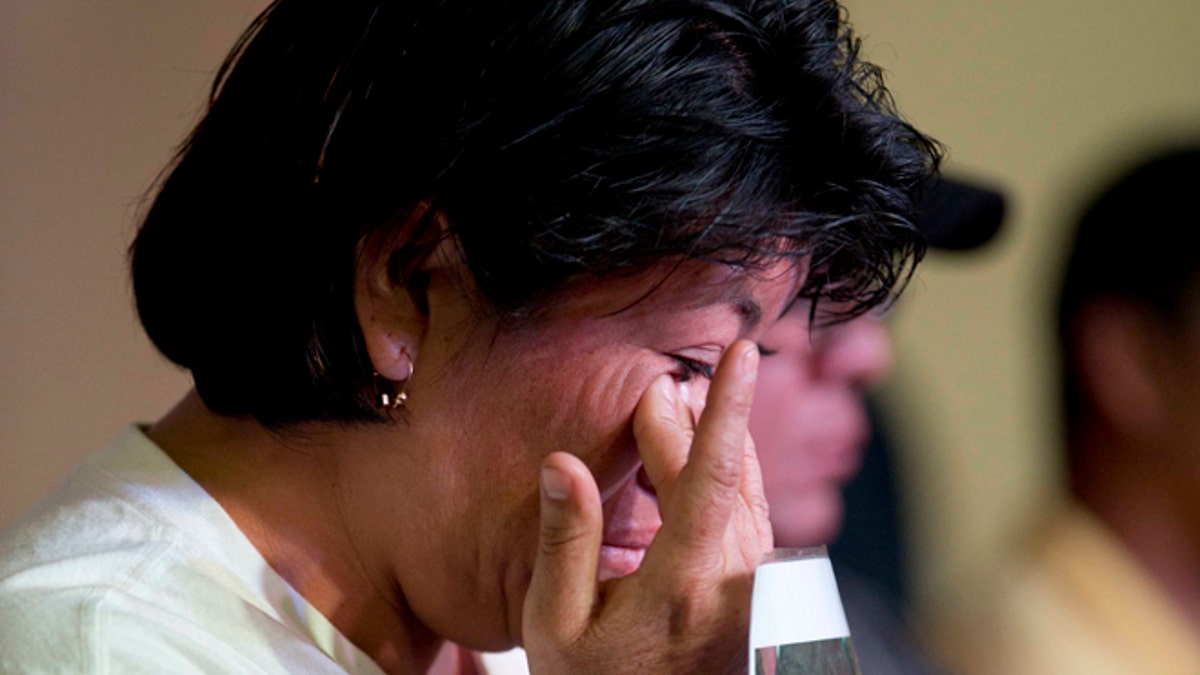
A relative during a press conference by the family members of the missing, in Mexico City, Jan. 27, 2015.
MEXICO CITY (AP) – Parents of 43 college students missing since last year angrily rejected the Mexican attorney general's declaration that investigators are certain the youths were killed and incinerated after being seized by police in the southern state of Guerrero.
In an emotional news conference Tuesday night, the parents accused the government of seeking to wrap up the investigation even as they still have many unanswered questions — and hold out hope of finding their children alive.
"We don't believe anything of what they say," said Carmen Cruz, mother of 19-year-old Jorge Cruz, one of the disappeared students. "We are not going to allow this case to be closed."
Lawyer Vidulfo Rosales, who is representing the families of the students from a rural teachers college, presented a 10-point argument explaining why they believe the investigation must continue, including a lack of conclusive forensic results. DNA tests were only able to positively identify the remains of one of the students, and an Austrian laboratory assisting in the case has said it appears impossible to identify the others.
Rosales noted that a number of key suspects remain at large. If detained, their testimony could shed new light on the official version, which asserts that on the night of Sept. 26, police handed over the students to drug gang members who killed them, burned the bodies at a garbage dump, bagged the remains and tossed them into a river.
Rosales also said the families will bring a formal complaint on Feb. 3 before the Committee on Enforced Disappearances at the U.N. Office of the High Commissioner for Human Rights.
The Mexican government "will have to respond for these events," he said.
Earlier in the day, Attorney General Jesus Murillo Karam said definitively for the first time that all the students were dead, citing confessions and forensic evidence that showed that the fire blazed for hours at a temperature sufficient to turn 43 bodies into ashes. The remains in bags found in the river had traces of the dump where the fire occurred.
The conclusion was based on the testimony of a suspect arrested two weeks ago who said he was called to get rid of the students, as well as 39 confessions, 386 declarations, 487 forensic tests, 16 raids and two reconstructions. So far 99 people have been detained in connection with the crime, including the former mayor of the city of Iguala, Jose Luis Abarca.
Murillo also denied that the army participated in or allowed the killings to happen, as victims' relatives have claimed.
The case has sparked widespread protests in the four months since the students disappeared and forced the government to turn its attention from touting economic and education reforms to dealing with crime and insecurity.
Murillo Karam's explanation Tuesday was unlikely to quell the controversy.
"They pretty much gave the same story as they had given two months ago. There are not many additional details," said analyst Alejandro Hope. "They are searching for closure but I'm not sure they're going to get it."
As for motive, the attorney general said members of a local gang known as the Guerreros Unidos believed the students were rival gang members when they hijacked public transit buses in Iguala for transport to a demonstration in the Mexican capital. But many of the suspects testified to knowing they were students.
Fire experts have doubted whether the bodies could have been incinerated beyond identification under the scenario outlined by authorities. And family members questioned the testimony of detained suspects, especially given Mexican authorities' track record of coercing confessions including through torture.
"A criminal's word cannot be worth more than ours," Cruz said.
Hope said the protests will likely continue while there is no unimpeachable evidence that the remains belong to the students. Also unclear are questions such as why the gang members would think the students were rivals, and why they would have killed them even after learning that wasn't the case.
"We know the who, the what, the when and the where. We don't know the why," Hope said. "They have yet to tell a compelling story of why this happened. It doesn't matter how many people they detain — unless they answer that question, the whole thing will remain under a halo of mystery."








































